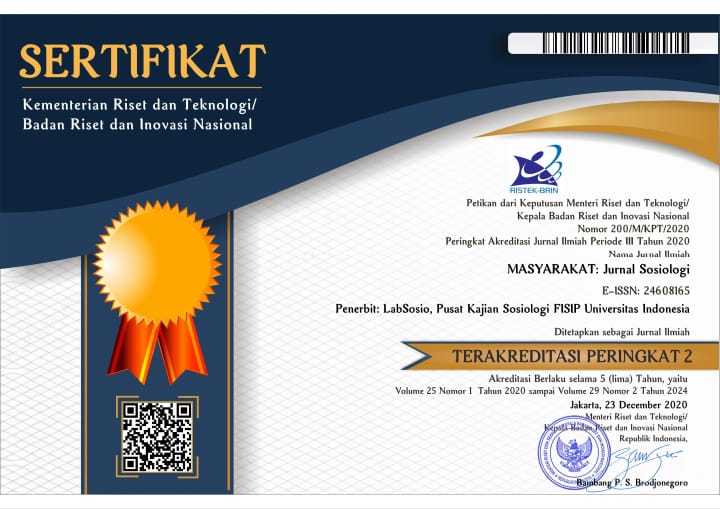Tragedi Kebudayaan dan Objektivasi Hubungan Manusia: Sebuah Refleksi mengenai Pemikiran Georg Simmel
Abstract
This article attempts to describe Simmel’s intellectual thoughts, particularly those related to the mode of human relationship. By applying a systematic literature review, this article demonstrates the uniqueness of Simmelian thought in comparison to other major classical sociological thinkers, like Emile Durkheim, Karl Marx, and Max Weber. For Simmel, a macro-level analysis on societal culture can be carried out by focusing on the micro dimension of the everyday life. In this context, Simmel speaks of the tragedy of culture that transpires through the process of objectification, where relationships become increasingly impersonal. At the end, this article provides a commentary on Simmel’s ethical thought and its link to the tragedy of culture.
Bahasa Abstract
Artikel ini berupaya untuk menjelaskan pemikiran Georg Simmel, khususnya mengenai mode relasi manusia. Dengan mengaplikasikan tinjauan literatur secara sistematik, artikel ini menunjukkan keunggulan pemikiran Simmel di tengah para pemikir sosiologi klasik lainnya seperti Emile Durkheim, Karl Marx, dan Max Weber. Bagi Simmel, analisis makro terhadap corak kebudayaan masyarakat dapat dipahami melalui pentingnya hubungan yang bersifat mikro dalam keseharian hidup. Dalam kontkes demikian Simmel mendiskusikan soal tragedi kebudayaan, yang terjadi melalui proses objektifikasi, di mana hubungan relasional menjadi semakin impersonal. Pada bagian akhir, penulis akan menyertakan sebuah tanggapan tentang etika dan hubungannya dengan tragedi kebudayaan.
References
Anderson, Benedict. 1983. Imagined Communities: Reflections on the Origin and Spread of Nationalism. New York: Verso.
Bauman, Zygmunt. 1989. Modernity and the Holocaust. Cambridge: Polity Press.
Buber, Martin. 1937. I and Thou. London: Bloomsbury Publishing.
Burhani, Ahmad Najib. 2017. “Geertz’s Trichotomy of Abangan, Santri, and Priyayi Controversy and Continuity.” Journal of Indonesian Islam, 11 (2): 329-350.
Chapman, Karen. 2021. “Characteristics of Systematic Review in the Social Sciences.” The Journal of Academic Librarianship 47 (5): 1
Durkheim, Emile. 1982. The Rules of Sociological Method. New York: The Free Press.
Durkheim, Emile. 1995. The Elementary Forms of Religious Life. The New York: Free Press.
Durkheim, Emile. 2009. Sociology and Philosophy. Abingdon: Taylor & Francis.
Fu, Yongxuan. 2021. “Towards Relational Spatiality: Space, Relation and Simmel’s Modernity.” Sociology: 1-17.
Hassan, Fuad. 2009. Kita dan Kami: Sebuah Analisis tentang Modus Dasar Kebersamaan. Jakarta: Winoka.
Natalia Canto. 2005 A Sociological Theory of Value: Georg Simmels’ Sociological Relationism. Bielefeld: Transcript Verlag.
Marx, Karl & Friedrich Engels. 1968. A Critique of The German Ideology. Moscow: Progress Publishers.
Marx, Karl & Freidrich Engels. 1988. Economic and Philosophic Manuscripts of 1844 and the Communist Manifesto. New York: Prometheus Books.
Meretoja, Hanna. 2014. “Narrative and Human Existence: Ontology, Epistemology, and Ethics.” New Literary History, 45: 89-109.
Mila, Natalia Canto. 2005 A Sociological Theory of Value: Georg Simmels’ Sociological Relationism. Transcript Verlag.
Morrison, Ken. 2006. Marx, Durkheim, Weber: Formations of Modern Social Thought. Sage Publications.
Muller, Hans-Peter, & Ferrara, Allesandro Cavalli. 2018. “How is Individuality Possible? Georg Simmel’s Philosophy and Sociology of Individualism.” Simmel Studies, 22(1): 15-33.
Ruggieri, Davide. 2017. “Georg Simmel and the ‘Relational Turn’: Contributions to the foundation of the Lebenssoziologie since Simmel.” Simmel Studies, 21(1): 43-71.
Salomon, Albert. 1995. “Georg Simmel Reconsidered.” International Journal of Politics, Culture, and Society, 8 (3): 361-378.
Simmel, Georg. 1904. “The Sociology of Conflict.” American Journal of Sociology, 9 (4): 490-525.
Simmel, Georg. 1971. On Individuality and Social Forms. Chicago: The University of Chicago Press.
Simmel, Georg. 2004. The Philosophy of Money. Oxfordshire: Routledge.
Simmel, Georg. 2008. Briefe 1912-1918. GSG 23, Frankfurt am Main: Suhrkamp.
Simmel, Georg. 1903. The Metropolis and Mental Life. New Jersey: Willey-Blackwell Publishing.
Skidelsky, E. 2003. “From epistemology to cultural criticism: Georg Simmel and Ernst Cassirer.” History of European Ideas, 29: 365-381.
Weber, Max. 1947. The Theory of Social and Economic Organization. New York: The Free Press.
Weber, Max. 1978. Economy and Society: An Outline of Interpretive Sociology. California: the University of California Press.
Weber, Max. 1992. The Protestant Ethic and the Spirit of Capitalism. Oxfordshire: Routledge.
Wertheim, Wim F. 1995. “The Contribution of Weberian Sociology to Studies of Southeast Asia.” Journal of Southeast Asian Studies, 26 (1): 17-29.
Widyanta, A.B. 2002. Problem Modernitas dalam Kerangka Sosiologi Kebudayaan Georg Simmel. Jakarta: Penerbit Cindelaras Pustaka Rakyat Cerdas.
Wilson, James. 1993. The Moral Sense. New York: Simon & Schuster.
Recommended Citation
Kurniawan, Kevin Nobel
(2024)
"Tragedi Kebudayaan dan Objektivasi Hubungan Manusia: Sebuah Refleksi mengenai Pemikiran Georg Simmel,"
Masyarakat: Jurnal Sosiologi: Vol. 29:
No.
1, Article 4.
DOI: 10.7454/MJS.v29i1.13574
Available at:
https://scholarhub.ui.ac.id/mjs/vol29/iss1/4
Included in
Critical and Cultural Studies Commons, Development Studies Commons, Gender, Race, Sexuality, and Ethnicity in Communication Commons, Human Geography Commons, International and Area Studies Commons, Nature and Society Relations Commons, Social Justice Commons, Social Statistics Commons, Sociology Commons, Urban Studies and Planning Commons


